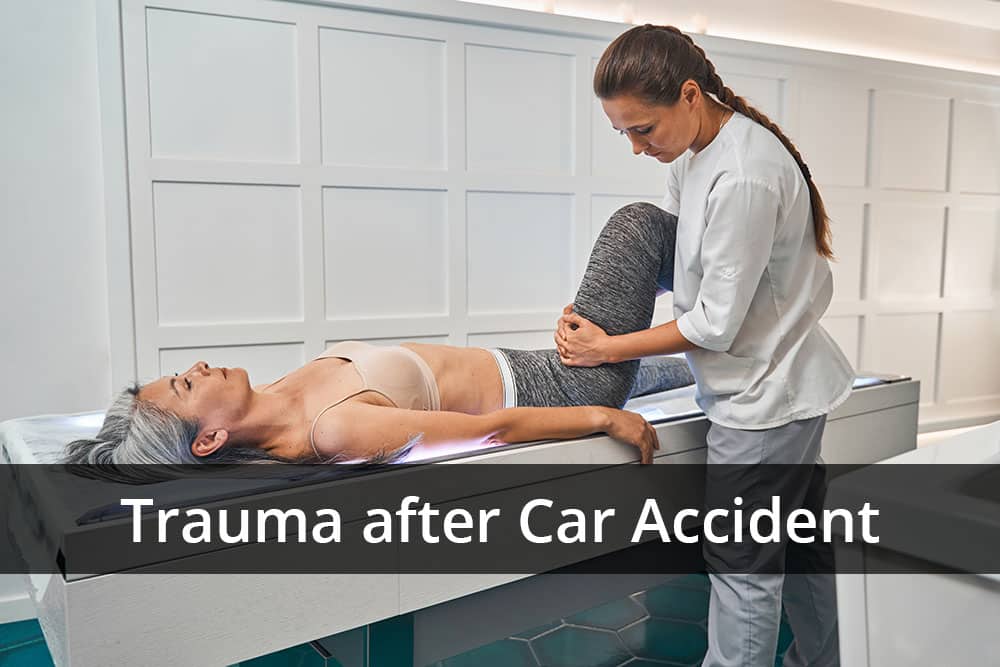Car accidents are terrifying and, in worse cases, can lead to permanent injuries. Car accidents often impact victims physically and they leave mental wounds too.Â
These mental wounds typically change the victims’ lives in every aspect. The life someone has known before an accident is no more, only adding to the nightmare of accident trauma.
PTSD, anxiety, depression, and other psychological conditions are typical of emotional trauma after a car accident. All of these conditions can, unfortunately, give way to even worse emotional problems.
That’s why it’s essential to ensure you contact a car accident lawyer who can adequately handle your case. It’s also critical that you take the right steps after an accident, not only legally but health-wise too.
Understanding your options regarding compensation is also critical. It’s especially important when pursuing personal injury claims.
Depending on the severity, the road to recovery can be tough, but there are some things you can do to help ease the pain of stress and any physical or emotional trauma.Â
Signs of Emotional Trauma After a Car Accident
Experiencing emotional trauma after a car accident is typically expected if the accident is very bad or ends in tragedy. However, it’s essential to understand you can experience the effects of trauma no matter the intensity of the accident.
So, even if the accident resulted in no serious injuries or tragedies, one can still feel the emotional impact of the accident.
Unfortunately, sometimes the effects are long-term.  Â
Emotional suffering can be a very detrimental problem in the lives of those affected. Perhaps the worst part of accident trauma is the victim and their loved ones all feel the impact.
These injuries can cause a separation within households as the victims may experience short-term effects, or they may potentially never be the same again.
There are several signs of trauma after an accident. It’s tough not to see these signs or symptoms since they typically onset fairly quickly after the event takes place.
At the first sign of mental or emotional change, it’s best to seek help. Talk to your doctor or someone you trust to let them know what’s going on. The lawyers at Stoy Law Group can recommend the best local doctors for treatment and help.
Ideally, it’s best to be a few steps ahead and seek professional help shortly after an accident. Taking this step may help to prevent any detrimental impacts on your mental health.
Having physical injuries alone can cause severe distress to one’s psyche. If the accident you were involved in was unfortunately fatal, that alone can cause nightmares and sleep deprivation.
There are several other signs of emotional trauma that can occur after involvement in a crash. Some are more common than others, but all should be treated right away if noticed.Â

Common signs of trauma after a car accident include:
- Fear
- Anxiety
- A loss of appetite
- Crying
- Feeling humiliated
- Mood swings
- Feelings of anger
- A loss of interest in activities
- Problems sleeping and nightmares
- Mental anguish or agony
Other signs include:
- PTSD
- Chronic depression
- The development of certain phobias
- Flashbacks
- Withdrawal from loved ones and society
Physical Symptoms Following Emotional Trauma
It’s prevalent for victims to experience the tough change of emotional trauma developing into physical symptoms. Unfortunately, this often makes it more challenging to recover as various physical symptoms accompany this issue.
Trouble Sleeping
Unfortunately, trouble sleeping after a car accident is prevalent. In addition, emotional and physical trauma can cause you to not sleep from the stress alone.
Stress or anxiety when trying to sleep can manifest into other physical problems like an upset stomach or muscle tension.
Loss of appetite also accompanies this sort of stress. High levels of intense nervousness also lead to an upset stomach, naturally making you lose your appetite.
Memory Loss and Problems Concentrating
Problems concentrating or memory loss often follow traumatic head injuries. However, they can also occur because of stress or physical or mental complications.
It may also be hard to form thoughts or simply concentrate on a simple task.
How to Properly Heal From Car Accident TraumaÂ
Although physical wounds after a car accident can eventually heal, mental injuries may take equal or more effort. So it’s imperative you take the proper action to ensure you properly heal any psychological trauma after a car accident.
If you’re traumatized after a car accident and don’t properly heal, it can, unfortunately, lead to long-term emotional trauma.
It’s also essential to account for healing physically as well as mentally. It will be a little tough to heal one without healing the other.
The best ways to properly heal are to:
- Get enough rest
- Ensure you take your prescribed medications
- Eat a balanced diet and drink enough water
- Stretch and exercise
- Properly manage your pain
- Make sure you have a good support system
Lastly, you must remain patient. Life after an accident can be uncertain, frustrating, and stressful, but it’s possible to recover.
How Long Does it Take to Recover From Car Accident Trauma?Â
It’s essential to understand what happens to you mentally after a car accident is common and in some ways, inevitable.
However, this trauma will take some time to get past.Â
Physically and mentally, recovery can and usually does take some time. However, the time it takes differs depending on the severity.Â
Generally, the recovery process for physical injuries varies from weeks to months. This includes physical therapy, surgeries, running tests, hospital stays, etc.
However, there is not a specific amount of time a victim can heal from emotional trauma. Unfortunately, this can impact the driver or even the passenger, long-term after an accident.
While long-term impacts are very much a real possibility, there are some steps you can take to help lessen the traumatic impact after involvement in a collision.
How to Mentally Recover From a Car Accident
Recovering from an accident can be a difficult feat. It’s challenging in many aspects however, there are steps you can take to make recovery just a little easier.
It’s crucial you are proactive during this process. Although you won’t have control over how long it could take, being proactive can guarantee fewer challenges throughout this new journey.
Try to Stick With Your Daily Routine
Although it’s very challenging, keeping with your daily routine can help immensely. Depression and anxiety from any traumatic situation can easily cause you to want to remain in bed and withdraw from life altogether.
However, keeping with your routine will help you to maintain normalcy for yourself while you recover. Your routines can also help you to keep in a lifted mood while helping you stay connected to the outside world.
Of course, you want to be careful if your routine includes a lot of movement as you don’t want to aggravate your physical injuries. It’s essential to take it slow but keep the momentum of your everyday life. Â

Talk to Someone
This step is one of the most essential steps in your recovery. It would help if you talked to someone and did not bottle up any emotions.
Someone could be a family member, a close friend, or a therapist. Unfortunately, there is a stigma that comes with talking about your emotions.
However, you mustn’t have any fear. It’s essential to not let any emotions fester as this could lead to potential long-term damage to your mental health.
Talking about how you feel will allow you to be comforted and lift the weight of your emotions off your shoulders. Victims of trauma, including car crashes, often feel alone.
By talking to someone consistently, you can keep negative emotions at bay while effectively healing emotionally.
Make Follow-Up Appointments
Make sure you follow up with, and talk to your doctor. It’s essential because your doctor can refer you to other specialists who can assist you through this tough time.
Try to Get Back Out There
It’s easy to recluse and shy away from driving, especially after a traumatizing event like a car crash. But keeping yourself inside will only make matters worse.
Getting some fresh air outside will help you in many ways. Although you may be unsure about driving again, at least ensure you interact with the outside world.
Avoiding leaving your house will only cause your trauma to develop into something worse. For example, you could easily develop a phobia of leaving home or of driving.
So, get fresh air and try your best to continue moving forward.
Drive Defensively
Defensive driving is an excellent skill for anyone, but especially for those who have experienced a bad accident. Defensive driving is the practice of driving to avoid potential dangers.
Driving defensively helps you avoid certain road events while allowing you to think ahead and navigate specific scenarios as carefully as possible.
Learning to drive defensively after involvement in an accident can help to build confidence after getting back on the road. This technique can also strengthen awareness and help you become less fearful and prepared.
How to Reduce Driving Anxiety after a Car AccidentÂ
Developing driving anxiety after a bad accident is not uncommon. Studies show between 25% and 33% of victims of collisions develop driving anxiety or PTSD.Â
Working through driving anxiety after an accident often takes therapy and exercises that help to reduce the trauma.
Take Driving Lessons
Taking up driving lessons can help you gain confidence on the road again. But unfortunately, trauma often takes away our faith and can cloud our memory.
Driving lessons can help you relearn anything you may have forgotten due to the trauma while helping you get comfortable behind the wheel again.
You can go at your own pace and set goals that will assist you in becoming more relaxed while rebuilding your skills. But, eventually, as with anything else, you will become used to being behind the wheel once more.
Practice Anxiety Exercises
After an accident, victims tend to experience high levels of anxiety in their everyday life and behind the wheel. Thankfully, several anxiety exercises you can practice will help you calm down during those moments of anxiousness.  Â
Some helpful exercises include:
- Muscle relaxation
- Taking deep breaths
- Visualization
- Counting
All of these exercises are quick and can even be done while driving. They can help to relax your mind and body while helping you maintain your focus.
Seek Therapy
There are also a variety of therapies you can try to help you get back to a safe place emotionally. After an accident, it’s best, along with medical attention, to also seek therapy.
Talking to someone can assist you in getting back to normalcy. Despite the severity, emotions often become scattered after an accident.
It’s not uncommon to experience severe depression, nightmares, panic attacks, and more. Likewise, accidents, especially those that unfortunately involve fatalities, can bring about an array of emotions and have a lasting impact.
Sometimes, these situations can also bring up emotions that you may not have been aware of. This leads to further emotional distress, which is why speaking to someone is critical.
Although therapy is highly recommended, a friend or family member works just as well. Bottling up emotions instead of properly dealing with the trauma will only cause more detriment to your emotional health.
Have a Support System
Having a healthy support system is critical at a time like this. It’s important you allow yourself to be vulnerable with those closest to you.
Opening up can help them better understand your needs and what direction and actions to take to help you heal.
Compensation
A victim can be compensated for emotional damages following a car accident. You must understand how it works to get the best possible compensation for your case.Â
The severity of the emotional trauma does have an impact on compensation. Ideally, it helps if you can show and prove the trauma occurred after the accident.
It also helps if you take note of as much as you possibly can.
For example, having your doctor notate any emotional challenges you’re having, or physical challenges can help to show the negative impact the situation is having on your daily life. Â
These actions can significantly assist you in a personal injury claim. Â

Emotional Damages
Anxiety after a car accident is considered emotional damage for which victims can receive compensation. Physical injuries are challenging, but mental injuries are also tough to endure.
A physical injury can potentially heal much faster than mental and emotional trauma.
However, just as a bodily injury disrupts your life, emotional wounds also impact you daily.Â
Receiving Compensation
Regarding compensation for car accident trauma, getting compensated for emotional damages can get a little complicated.
To start, you must ensure you have everything documented.Â
Ensuring you keep documentation will enormously help with your case. The reason it will help is that emotional trauma or distress is considered to be non-economic damages.
Non-economic damages are defined as emotional distress or pain and suffering due to a negligent injury. Emotional distress and pain & suffering include:
Emotional Anguish or Humiliation
This includes any emotional trauma or distress due to the accident. An example will be if a victim has permanent physical changes or disfigurement because of a car accident.
They should receive compensation due to the mental anguish they will endure from these physical changes.
A Loss of Companionship
Often once a victim experiences an accident of any kind, they are not the same. Victims themselves carry new challenges but these challenges also impact their loved ones.
Sustaining short-term or long-term injuries may cause an inability to interact with their loved ones like they did before.
It will impact the relationship with a spouse or the ability to spend quality time with kids.
Sometimes, depending on the severity of the injury, intimacy is even affected within a marriage.
For example, the spouse would be eligible for non-economic damages in a case such as this.
The Suffering of Chronic Pains as a Result of Injuries Sustained
Injuries can cause chronic pains that sometimes are untreatable. These pains heavily impact a victim’s daily routine and quality of life.
In this case, non-economic damages can be compensated for pain and injuries.
Inability to Enjoy Your Life
It may not sound very severe; however, the inability to enjoy life can cause a strain on the victim’s emotional state and daily life. This stress and tension on emotions will also make a victim eligible to receive non-economic compensation.
Pain or Suffering Throughout Recovery
Victims often endure pain while going through recovery or treatment for their injuries, for which they are also able to be compensated.
Emotional Distress Compensation Caps
The number of compensation victims can receive for emotional distress varies by state. These compensation caps limit how much you can be paid depending on the injury’s severity.Â
The cap will also depend on the laws in your state or jurisdiction and what type of case you have. Despite this, do remember that it’s possible to receive compensation for this kind of trauma.
Everything that follows a car accident is, unfortunately, life-changing and very real.
Developing specific fears, changes to your mind and body, withdrawal, depression, etc., all are considered to be emotional damage for which you deserve compensation.  Â
Get Help from the Lawyers at Stoy Law Group
If you have recently been in an accident and are struggling day-to-day, call and speak with an attorney at the Stoy Law Group today. Our experienced personal injury lawyers will make sure you get the proper treatment, care and compensation you deserve.














